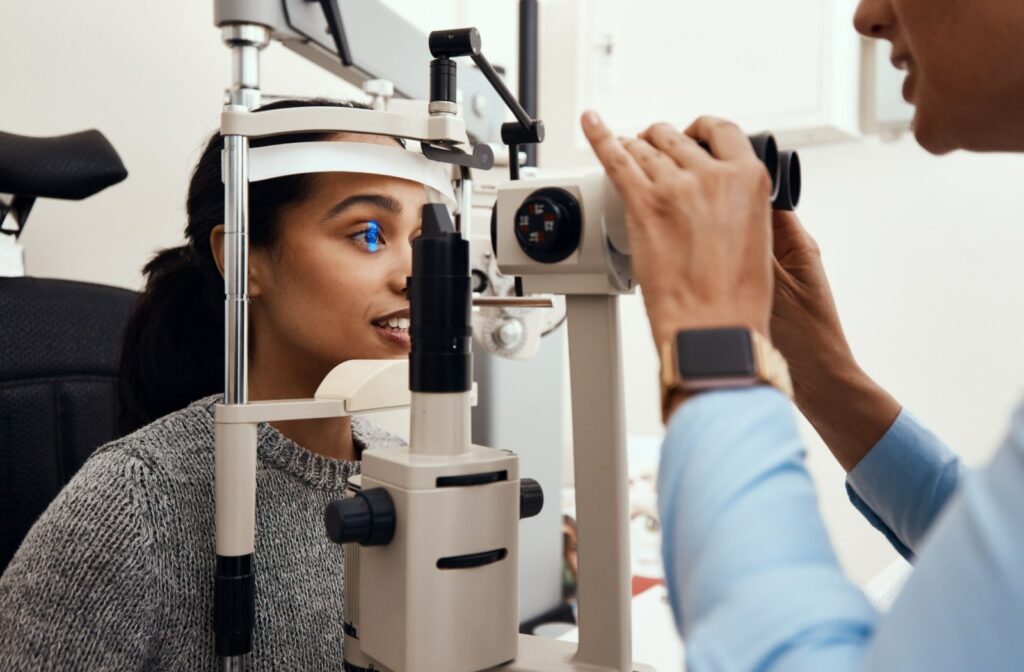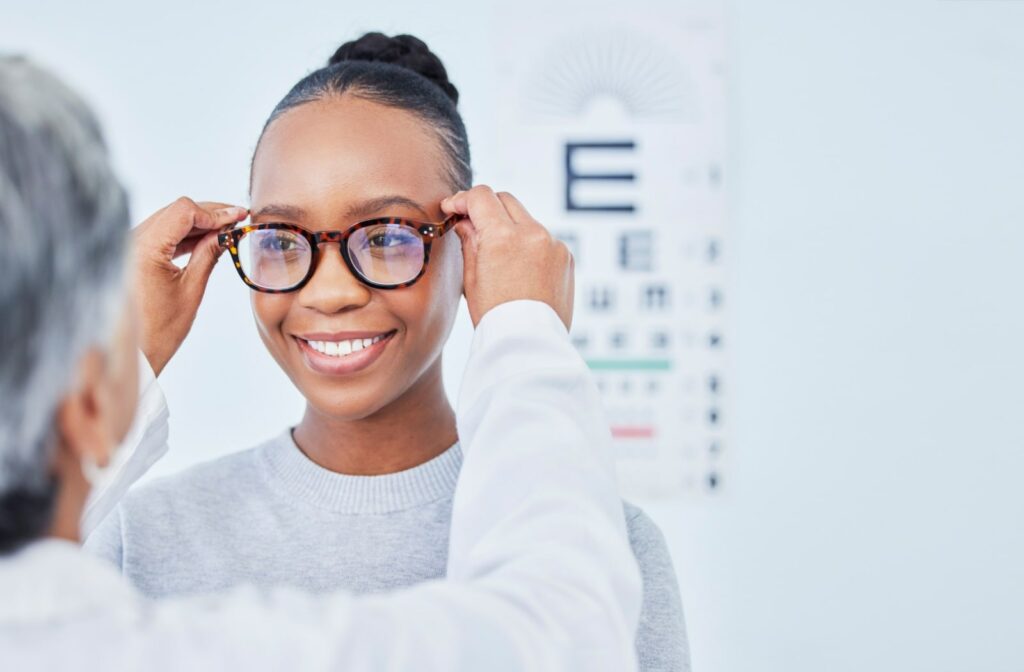Visiting your optometrist for routine eye exams is important for maintaining healthy vision and ocular health.
The frequency of eye exams varies depending on several individual factors including age, health status, existing ocular concerns, and whether an individual wears contact lenses or is diagnosed with diabetes.
The Importance of Eye Exams
Regular eye exams are about more than updating your vision prescription. They are important for the early diagnosis and management of various eye and general health conditions.
Many ocular and general health conditions can manifest without any symptoms. Eye exams can help to detect any unknown health concerns, making them important for early detection and preventative care.
Eye exams go far beyond checking for vision correction. Through various tools and visual health assessments, many ocular conditions can be detected during a routine eye exam, including:
- Cataracts: Cataracts develop when the natural lens of the eye becomes cloudy, impairing vision.
- Diabetic Retinopathy: Diabetes can lead to complications in the eyes, making regular check-ups vital for those with diabetes.
- Dry Eye Disease: When tears can’t adequately moisturize the eyes leading to irritated eyes and blurry vision.
- Glaucoma: Glaucoma can damage the optic nerve and lead to vision loss if left untreated.
- Macular Degeneration: Macular degeneration occurs when a structure of the retina, the macula, becomes damaged, affecting one’s central vision.
Optometrists can detect general health conditions through a routine eye exam. Some signs of a condition can manifest in the eyes, without an individual experiencing any symptoms, including:
- Diabetes: Changes in the blood vessels of the retina can indicate diabetes before an individual has even been diagnosed.
- Heart Disease: Certain patterns in the retinal blood vessels can signal cardiovascular issues using OCT scans and images.
- High Blood Pressure: Bends or bleeding from blood vessels in the back of the eye are signs of high blood pressure. Individuals with high blood pressure are at risk for developing eye diseases like glaucoma.
- High Cholesterol: Deposits around the cornea and blood vessels of the retina can indicate elevated cholesterol levels.
Comprehensive Eye Exams
A comprehensive eye exam involves a vision assessment to identify refractive errors and confirm that an individual’s eye prescription is up-to-date.
The length of an eye exam varies depending on a patient’s age, ocular health, and any visual concerns they may have. A children’s eye exam may take 15 to 45 minutes while adult and senior exams may take 25 to 55 minutes.
Children’s Eye Exams
Children’s eyes are rapidly growing and changing making routine eye exams important. While our eyes continue to grow they are subject to experiencing significant changes in their visual prescriptions.
The Canadian Association of Optometrists recommends that children between the ages of 6 months and 18 years have a comprehensive eye exam at least once a year due to the rapid changes in their eye development.
Children can have their eye exams as young as 6 months old! During an infant or young child’s eye exam, the optometrist will focus on assessing eye development by testing their eye muscle movements, eye alignment, and their eye’s ability to focus.
If the optometrist suspects that a child’s eyes are straining and overfocusing during the exam, they may suggest the child undergo a cycloplegic refraction. It involves using eye drops to temporarily dilate and relax eye muscles, preventing the eye from changing focus during the exam and helping to obtain an accurate vision prescription.

Adult Eye Exams
Adults between the ages of 19 and 64 are recommended to have a routine eye exam once every two years. Our eyes stop growing at around age 20. This is also around the time our vision prescription stabilizes.
By age 40, it’s advised to have an eye exam to catch early signs of diseases or vision changes as this is around the age when we see visual concerns start to appear.
Senior Eye Exams
Older adults 65 and older are encouraged to have annual routine eye exams. Aging can increase the risk of developing vision concerns.
Older adults are at a higher risk for:
- Difficulty distinguishing colors
- Difficulty seeing at night
- Increased glare sensitivity
- Vision injuries related to falls
- Age-related macular degeneration (AMD)
- Cataracts
Contact Lens Exams & Fittings
Individuals who wear contact lenses are advised to visit their optometrist annually for exams and contact lens fittings as contact lens prescriptions expire annually.
These visits ensure that your eyes stay healthy for contact lens wear and allow the optometrist to adjust your prescription as needed. Wearing outdated or incorrectly prescribed lenses can cause discomfort and potentially harm your eyes.
Diabetic Eye Exams
Type 1 and type 2 diabetes can impact vision and overall eye health. Individuals with diabetes are advised to have an annual diabetic eye exam to maintain healthy vision and prevent ocular issues.
During a diabetic eye exam, your optometrist will focus on evaluating the health of your retina and ocular blood vessels. With drops, the pupils are dilated to examine the internal structures of the eye that may not be visible during an undilated exam. The optometrist will check for abnormal blood vessels or retinal swelling, indicators of diabetic retinopathy.
Diabetes increases one’s risk of developing eye conditions like glaucoma, diabetic retinopathy, and diabetic macular edema. Like other ocular and health conditions, these conditions can manifest with little to no noticeable symptoms.
Book an Appointment in Maple Ridge Today
Visiting your optometrist for routine eye exams is an important part of maintaining overall health and well-being. The frequency of one’s eye exam appointments varies based on age, ocular health, and overall health status.
Connect with our team at Maple Ridge Eye Care to schedule your next eye exam appointment!

